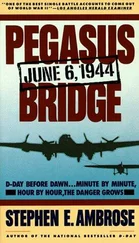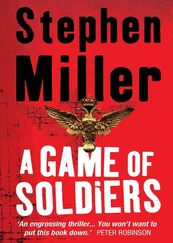Stephen Ambrose - Citizen Soldiers [Condensed]
Здесь есть возможность читать онлайн «Stephen Ambrose - Citizen Soldiers [Condensed]» весь текст электронной книги совершенно бесплатно (целиком полную версию без сокращений). В некоторых случаях можно слушать аудио, скачать через торрент в формате fb2 и присутствует краткое содержание. Жанр: История, на английском языке. Описание произведения, (предисловие) а так же отзывы посетителей доступны на портале библиотеки ЛибКат.
- Название:Citizen Soldiers [Condensed]
- Автор:
- Жанр:
- Год:неизвестен
- ISBN:нет данных
- Рейтинг книги:5 / 5. Голосов: 1
-
Избранное:Добавить в избранное
- Отзывы:
-
Ваша оценка:
- 100
- 1
- 2
- 3
- 4
- 5
Citizen Soldiers [Condensed]: краткое содержание, описание и аннотация
Предлагаем к чтению аннотацию, описание, краткое содержание или предисловие (зависит от того, что написал сам автор книги «Citizen Soldiers [Condensed]»). Если вы не нашли необходимую информацию о книге — напишите в комментариях, мы постараемся отыскать её.
Citizen Soldiers [Condensed] — читать онлайн бесплатно полную книгу (весь текст) целиком
Ниже представлен текст книги, разбитый по страницам. Система сохранения места последней прочитанной страницы, позволяет с удобством читать онлайн бесплатно книгу «Citizen Soldiers [Condensed]», без необходимости каждый раз заново искать на чём Вы остановились. Поставьте закладку, и сможете в любой момент перейти на страницу, на которой закончили чтение.
Интервал:
Закладка:
Over the target, a few metres above the ground, an 88 shell burst just behind Thompson's jeep. The concussion broke the latches of the nose section, which flipped up, throwing the pilots out. The blast cut the ropes that held the jeep, which leaped out of the glider, engine running, flying through the air, Thompson gripping the steering wheel with all his might. He made a perfect four-wheel landing and beat the glider to the ground, thus becoming the first man in history to solo in a jeep.
The glider crashed and tipped, ending rear end up. Lieutenants Merryman and Heffner survived their flying exit but were immediately hit by machine-gun bullets, Heffner in the hand and Merryman in the leg. They crawled into a ditch. Thompson drove over to them.
"What the hell happened?" he demanded, but just then a bullet creased his helmet. He scrambled out of the jeep and into the ditch, saying he'd just taken his last glider ride. Then he treated their wounds and drove Merryman and Heffner to an aid station.
Operation Varsity featured not only a flying jeep, it also provided a unique event in US Army Air Force history. At the aid station, Merryman and Heffner met the crew of a B-24 that had been shot down and successfully crash-landed. When the air force guys started to dash out of their burning plane, the first man was shot, so the rest came out with hands up. The Germans took them to the cellar of a farmhouse, gave them some Cognac, and held them "while the Germans decided who was winning. A little later the Germans realized they were losing and surrendered their weapons and selves to the bomber crew. The Germans were turned over to the airborne." This was perhaps the only time a bomber crew took German infantry prisoners.
Before the end of the day the airborne troops had all their objectives, and over the next couple of days the linkup with the infantry was complete. Twenty-first Army Group was over the Rhine.
BY THE FIRST week of spring 1945, Eisenhower's armies had done what he had been planning for since the beginning of the year_close to the Rhine along its length, with a major crossing north of Dusseldorf-and what he had dared to hope for, additional crossings by First Army in the centre and Third Army to the south. The time for exploitation had arrived. The Allied generals were as one in taking up the phrase Lieutenant Timmermann had used at the Remagen bridge-Get going!
The 90th Division, on Patton's left flank, headed east towards Hanau on the Main River. It crossed in assault boats on the night of March 28. Major John Cochran's battalion ran into a battalion of Hitler Youth officer candidates, teenage Germans who were at a roadblock in a village. As Cochran's men advanced, the German boys let go with their machine gun, killing one American. Cochran put some artillery fire on the roadblock and destroyed it. "One youth, perhaps aged 16, held up his hands," Cochran recalled. "I was very emotional over the loss of a good soldier and I grabbed the kid and took off my cartridge belt.
"I asked him if there were more like him in the town. He gave me a stare and said, 'I'd rather die than tell you anything.' I told him to pray, because he was going to die. I hit him across the face with my thick, heavy belt. I was about to strike him again when I was grabbed from behind by Chaplain Kerns. He said, 'Don't!' Then he took that crying child away. The Chaplain had intervened not only to save a life but to prevent me from committing a murder." From the crossing of the Rhine to the end of the war, every man who died, died needlessly. It was that feeling that almost turned Major Cochran into a murderer.
Hitler and the Nazis had poisoned the minds of the boys Germany was throwing into the battle. Captain F.W. Norris of the 90th Division ran into another roadblock. His company took some casualties, then blasted away, wounding many. "The most seriously wounded was a young SS sergeant who looked just like one of Hitler's supermen. He had led the attack. He was bleeding copiously and badly needed some plasma." One of Norris's medics started giving him a transfusion. The wounded German, who spoke excellent English, demanded to know if there was any Jewish blood in the plasma. The medic said damned if he knew, in the US people didn't make such a distinction. The German said if he couldn't have a guarantee that there was no Jewish blood he would refuse treatment.
Norris remembered: "In very positive terms I told him I really didn't care whether he lived or not, but if he did not take the plasma he would certainly die. He looked at me calmly and said, 'I would rather die than have any Jewish blood in me.'
"So he died."
BY MARCH 28 First Army had broken out of the Remagen bridgehead. General Rose's 3rd Armoured Division led the way, headed for the linkup with Ninth Army. That day Rose raced ahead, covering 90 miles, the longest gain on any single day of the war for any American unit. By March 31 he was attacking a German tank training centre outside Paderborn. Rose was at the head of a column in his jeep. Turning a corner, his driver ran smack into the rear of a Tiger tank. The German tank commander, about eighteen years old, opened his hatch and levelled his burp gun at Rose, yelling at him to surrender.
Rose, his driver, and his aide got out of the jeep and put their hands up. For some reason the tank commander became extremely agitated and kept hollering while gesturing towards Rose's pistol. Rose lowered his arm to release his web belt and drop his holster to the ground. Apparently the German boy thought he was going to draw his pistol. In a screaming rage he fired his machine pistol straight into Rose's head, killing him instantly. Maurice Rose was the first and only division commander killed in ETO.
In most cases the retreating Germans did not stop to fight. Generally they passed right through the villages, rather than use them as strong-points. First and Third armies were advancing in mostly rural areas, spending their nights in houses. The GIs would give the inhabitants five minutes or so to clear out. The German families were indignant. The GIs were insistent. As Major Max Lale put it in a March 30 letter home, "None of us have any sympathy for them."
The rural German homes had creature comforts-electricity, hot water, soft, white toilet paper-such as most people thought existed in 1945 only in America. On his first night in a house Private Joe Burns spent five minutes in a hot shower. Fifty-one years later he declared it to be "the most exquisite five minutes in my life. Never before or since have I had such pure pleasure." Private David Webster recalled washing his liands at the sink and deciding, "This was where we belonged. A small, sociable group, a clean, well-lighted house [behind blackout curtains], a cup of coffee-paradise." Things were looking up, even though there was still a lot of Germany to overrun.
Chapter Twelve
Victory: April 1-May 7. 1945
EASTER CAME on April 1 in 1945. In many cases the celebration of the Resurrection brought the GIs and German civilians together. Sergeant Lindy Sawyers of the 99th Division and his squad had moved into a house that was big enough to allow the frau and her two small girls to remain. He remembered that on the day before Easter, "I entered the house and heard a wail from the mom and kids." He asked what was wrong and was told that some of his men had stolen the family Easter cake. Sawyers investigated and caught two recruits who had done the deed. He returned the cake to its owners. "There was great rejoicing and I felt virtuous, for a second at least."
Sergeant Oakley Honey recalled that as his squad left the house they had slept in, "the old lady was handing something to each guy as we left. As I got to the woman, I could see tears in her eyes as she placed a decorated Easter Egg in my hand. We had treated them well and not disturbed the main part of the house. For this they were thankful. There was an unwritten code. If you had to fight for a town, anything in it was yours. If we were allowed to walk in unopposed, we treated the population much better."
Читать дальшеИнтервал:
Закладка:
Похожие книги на «Citizen Soldiers [Condensed]»
Представляем Вашему вниманию похожие книги на «Citizen Soldiers [Condensed]» списком для выбора. Мы отобрали схожую по названию и смыслу литературу в надежде предоставить читателям больше вариантов отыскать новые, интересные, ещё непрочитанные произведения.
Обсуждение, отзывы о книге «Citizen Soldiers [Condensed]» и просто собственные мнения читателей. Оставьте ваши комментарии, напишите, что Вы думаете о произведении, его смысле или главных героях. Укажите что конкретно понравилось, а что нет, и почему Вы так считаете.
![Stephen Ambrose Citizen Soldiers [Condensed] обложка книги](/books/346737/stephen-ambrose-citizen-soldiers-condensed-cover.webp)








